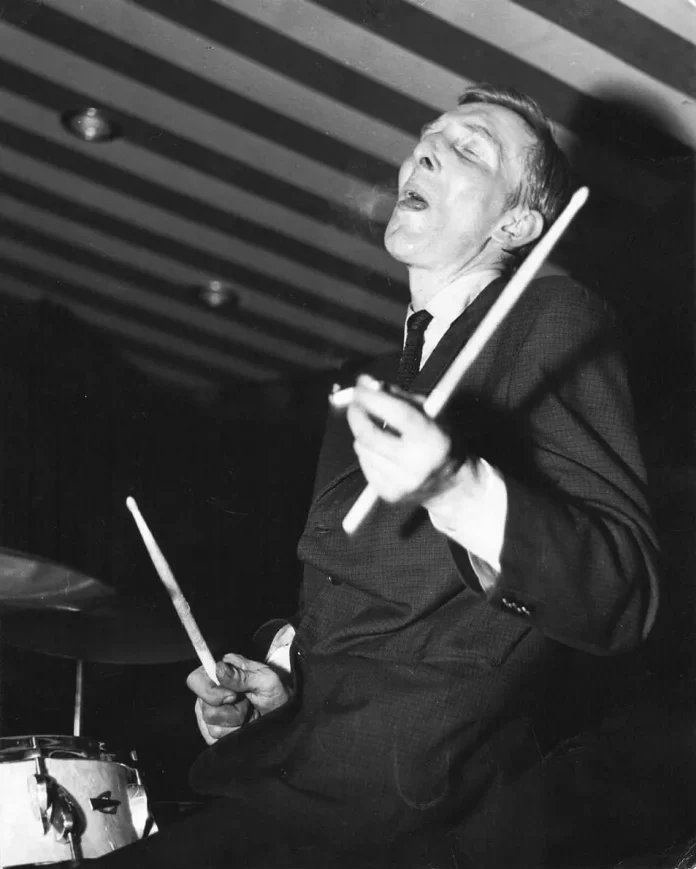One of the major events in London 1972 has been the resurgence of Phil Seamen. Suddenly be has regular Tuesday and Wednesday gigs at ‘The Jolly Cockney’ in Lambeth, Fridays at ‘The Hope & Anchor’ in Islington and Saturdays and Sundays at Stockwell’s ‘Plough’.
The format during the week is a piano / bass / drums trio plus one or two guest horns. During the year I have heard several sessions with such guests as Tubby Hayes, Don Rendell, Kenny Wheeler and Tony Coe benefitting from Phil’s booting behind them.
For although Phil’s time concept is as pre-Elvin as ever, and although his Klook roots are still very prominent, he has perfected his style so that he now reaches the limits of freedom permissible within his chosen area. Listening to him is rather like listening to Elvin playing hard bop – they both go so far out that one cannot imagine how they are going to get back in again until it inevitably happens as if by a miracle.
This is real edge-of-the-seat drumming. But not only that, it also is extremely powerful drumming, from the constant steaming cymbals and the punching snare to the booting bass-drum and the roaring loms. And watch out for that sense of humour, still as bombastic as his drumming. Hecklers beware!
On weekends at Tbe Plough no horns are used. Sundays feature the piano of Brian Lemon, replaced by Stan Tracey on Saturdays. It was one of these Saturday evenings which recently gave me one of my most exciting ‘live’ listening experiences for some time.
One of the major events in London 1971 was the drifting of Stan Tracey into free jazz. However, if his Saturdays with Phil are anything to go by, he is probably still a bopper at heart. He still manages to play old war-horses such as I Let A Song Go Out Of My Heart and Exactly Like You as if he had just composed them, while his own classics like Afro-Charlie sound fresher than ever.
Then there is an up-tempo I’m Getting Sentimental Over You which he possible throws in to show how different he is from his main influence, Monk. (This difference was even more marked on another occasion, with John Stevens depping excellently for Phil, when Stan actually played several tunes written by Monk.)
Great as these two are in their own ways, the interplay between them is something else. After all, Stan is a very percussive pianist and needs to be matched by such a strong percussionist as Phil. The sparks continually fly between the two of them, most notably during a formidable conga that would scare a few ballroom dancers.
Anchoring the music to the earth is bassist Kenny Baldock, who plays very strongly if not as stunningly as the rest of the trio. So, if you are a bopper at heart, don’t spend your Saturday evenings at home – there has never been anything on television to match the excitement of this incredible trio.
Postscript: The above review was written in early September. Now, in mid-October, Phil Seamen is dead. It is doubly tragic that this should occur when he was playing so well and so often; surely he will be remembered as just about the best British jazzman ever.
















